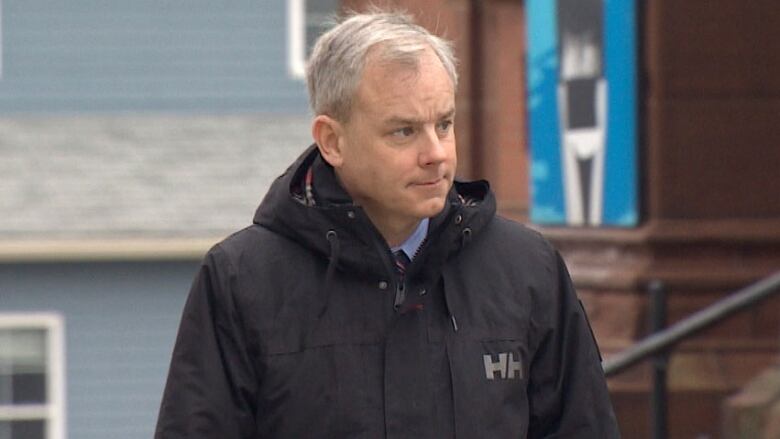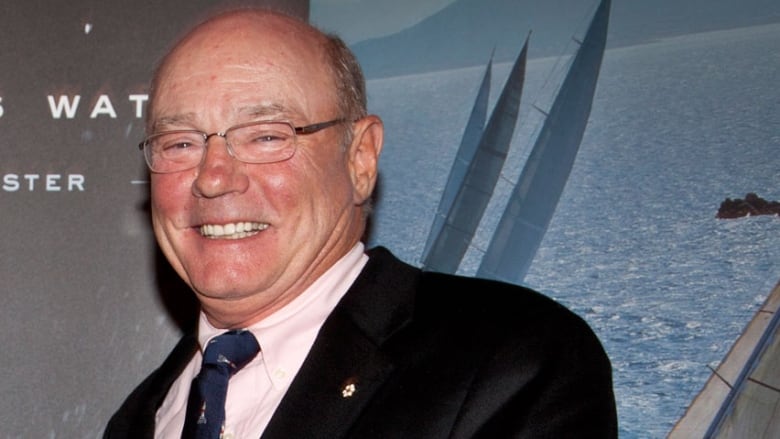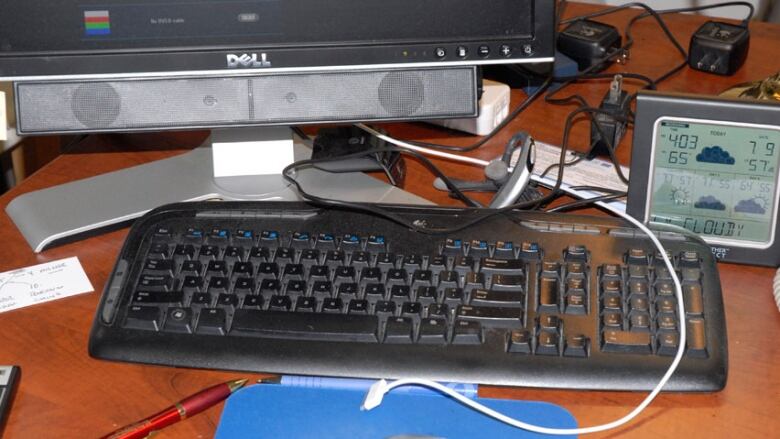Oland defence lawyers' novel motion about victim's missing iPhone postponed
Oland, 50, is being retried for 2nd-degree murder in the 2011 bludgeoning death of his father Richard

Legal arguments on an unusual application by Dennis Oland's defence lawyers to havehearsay evidence about the unsuccessful search for his dead father's missing cellphonedeclared as fact have been postponed for at least a week.
The issue was expected to be dealt with at his murder retrial in Saint John on Friday, but Court of Queen's Bench Justice Terrence Morrison agreed to give the Crown more time to consider whether it wants to call any evidence.
A hearing willbe held the week of Feb. 19.
No other witnesses were lined up for Friday, so the trial is adjourned until Tuesday at 9:30 a.m., when the Crown will call a cellphone networkexpert to testify.
Oland, 50, is being retried for second-degree murder in the 2011 bludgeoning death of his father, multimillionaire Richard Oland.
He is the last person known to have seen his father alive when he visited him at office on July 6, 2011, from around 5:35 p.m. until 6:30 p.m.
The body of the 69-year-old was found in the office the next morning with 45 sharp- and blunt-force injuries to his head, neck and hands. His iPhone was the only item that went missing from the crime scene and has never been recovered.
Oland's defence team wants the court to declare as fact that the first "roaming error" in the unsuccessful search for the victim'siPhone occurred on July 7,shortly after his body was discovered, as testified to by a Saint John Police Force officer.
Acting Insp. David Brooker told the court he called Rogers Communications at 4:30 p.m.that dayabout locating the phone and obtaining the victim's phone records and was advised at that time of the roaming error.

Any Rogers records of that search have since been purged.
Normally, courts can't accept one person's account of a two-person conversation for the truth of its contents. But the defence contends Brooker'stestimony about his conversationwith the Rogers employeemeets the exception rule for hearsay evidence because it was an exchange between two professionals, each performing his duty.
Defence lawyer Alan Gold acknowledged it's a novel argument,"rarely used" in criminal cases.
The significance of the issue in the case againstOlandhas not yet been revealed, but the Crown and defence have reversed positions sincethe first trial as to when the roaming error occurred.
The Crown contends the officer is mistaken about the date and that it was July 9, 2011 when Rogers made three attempts to locate the phone for police by sending out signals, so-called "forced registrations," and all three came back with the message "roaming error."

The term "roaming error" has not yet been defined for the court.
During Oland's first trial, the Crown and defence submitted an agreed statement that "roaming error" could mean one of three things:
- The phone is registered on a foreign network with which Rogers doesn't have a roaming agreement.
- Rogers can't locate the phone because records of its location have been purged after a period of inactivity, with no calls, texts or data access.
- The location of the phone can't be obtained for "some unspecified reason."
Gold said Thursday the defence was "misinformedat the first trial."
"We now understand 'roaming error' correctly," he said.
- On mobile? Get the latest details from our live blog
Computer evidence shows the victim had the iPhone with him in his office on the afternoon he was killed. It was connected to his computer at 1:50 p.m. and disconnected at 4:44 p.m., after a backup was created.
The last communication the phone received was a text message at 6:44 p.m., which was transmitted by a cell tower in Rothesaynear Renforth wharf, where the accused told police he had stopped on his way home from visiting his father.
All incoming calls after that time went directlyto voicemail and no text messages were delivered, the retrial has heard.
A jury foundOlandguilty in 2015, butthe Court of Appeal overturned hisconvictionand ordered a new trial, citing an error in the trial judge's instructions to the jury. He is being retried by judge alone.
On Tuesday, JosephSadoun, a radio frequency engineer, is expected to testify about thelikely location of the victim'siPhonewhen it received its last communication before falling silent.
The testimony of RCMPbloodstain analyst Sgt. Brian Wentzell is expected to fill the remainder of the week.
The Crown and defence have agreed to use the 2015 videotaped testimony of DNA experts instead of recalling them to the stand, which should help save time.
Gold told the court he expects the presentation of evidence will be completed by March 8.












_(720p).jpg)


 OFFICIAL HD MUSIC VIDEO.jpg)
.jpg)



























































































